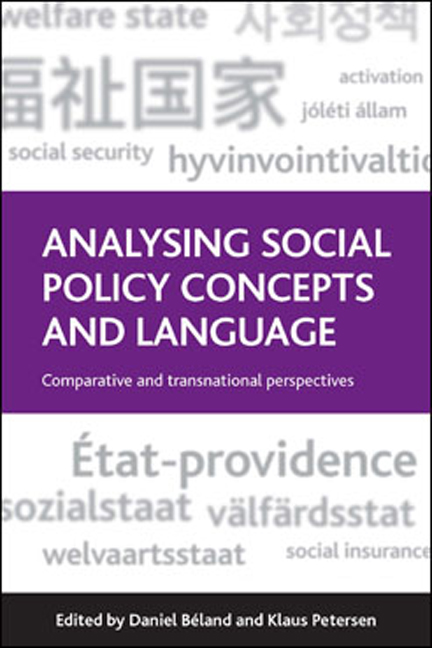Book contents
- Frontmatter
- Contents
- List of figures and tables
- Acknowledgement
- Notes on contributors
- Introduction: social policy concepts and language
- one Social policy language in Denmark and Sweden
- two The changing language of social policy in Hungary and Polan
- three Languages of ‘social policy’ at ‘the EU level’
- four The OECD's search for a new social policy language: from welfare state to active society
- five The discursive power of international organisations: social policy language and concepts in the World Bank and the International Monetary Fund
- six Original and imitated or elusive and limited? Towards a genealogy of the welfare state idea in Britain
- seven Social policy concepts and language in France
- eight The language of social politics in Finland
- nine Germany: constructing the ‘win-win’ society
- ten Conceptual development of welfare and social policy in Japan
- eleven Transition to the ‘universal’ welfare state: the changing meaning of ‘welfare state’ in Korea
- twelve The Dutch ‘caring state’
- thirteen Panacea, problem or perish: social policy language in New Zealand
- fourteen Evolving social policy languages in Spain: what did democracy and EU membership change?
- fifteen Social policy language in the United States
- Conclusion: comparative perspectives on social policy language
- Index
fourteen - Evolving social policy languages in Spain: what did democracy and EU membership change?
Published online by Cambridge University Press: 04 March 2022
- Frontmatter
- Contents
- List of figures and tables
- Acknowledgement
- Notes on contributors
- Introduction: social policy concepts and language
- one Social policy language in Denmark and Sweden
- two The changing language of social policy in Hungary and Polan
- three Languages of ‘social policy’ at ‘the EU level’
- four The OECD's search for a new social policy language: from welfare state to active society
- five The discursive power of international organisations: social policy language and concepts in the World Bank and the International Monetary Fund
- six Original and imitated or elusive and limited? Towards a genealogy of the welfare state idea in Britain
- seven Social policy concepts and language in France
- eight The language of social politics in Finland
- nine Germany: constructing the ‘win-win’ society
- ten Conceptual development of welfare and social policy in Japan
- eleven Transition to the ‘universal’ welfare state: the changing meaning of ‘welfare state’ in Korea
- twelve The Dutch ‘caring state’
- thirteen Panacea, problem or perish: social policy language in New Zealand
- fourteen Evolving social policy languages in Spain: what did democracy and EU membership change?
- fifteen Social policy language in the United States
- Conclusion: comparative perspectives on social policy language
- Index
Summary
This chapter analyses the historical evolution of the social policy languages and concepts in Spain. It focuses on the changing meanings of ‘social security’ (seguridad social) and ‘welfare state’ (estado del bienestar) but it also takes into account how entitlements and recipients were defined and how these notions changed over time.
The interest in the Spanish case for analysing the evolution of social policy language is derived precisely from its peculiar historical development. Modern social policy was initiated in Spain in 1900. The development of social insurance followed the Bismarckian model from then until the end of Franco's authoritarian regime in 1975. However, since the advent of democracy, the Spanish social protection system has become a mixed model a la Esping-Andersen (1990); in other words, it has been based on à combination of social democratic, conservative-corporatist, and liberal principles, where policy areas differ with respect to institutional design. For instance, while the income maintenance system remains broadly rooted in Bismarckian principles, health care, education, and, partially, social care services, have been universalised following the social democratic model. The analysis in this chapter focuses on the ways in which social policy language in Spain's various policy areas reflects the influence of the Bismarckian, social democratic and liberal models of welfare capitalism.
The chapter is divided into two main sections. The first section addresses briefly the language used in the origins and early construction of the Spanish social protection system during Franco's dictatorship (1939–75). The second section explores the evolving meanings of ‘social security’ and ‘welfare state’ during the democratic period (1975 to the present). Changes in the historical construction of social policy language were brought about not only because of the advent and consolidation of a democratic regime, but also because of the inclusion of Spain in the European Economic Community in 1986.
Social policy languages: origins and historical construction of the Spanish social protection system
As already stated, the Spanish social protection system was initiated in the late 19th century with a debate grounded on ‘the social question’ (la cuestion social). This constituted a fundamental ideological turning point: people in need should no longer be protected only by charitable bodies and institutions, but the state was to play a direct (but still limited) role in the provision of social protection, understood as a social right.
- Type
- Chapter
- Information
- Analysing Social Policy Concepts and LanguageComparative and Transnational Perspectives, pp. 263 - 276Publisher: Bristol University PressPrint publication year: 2014



